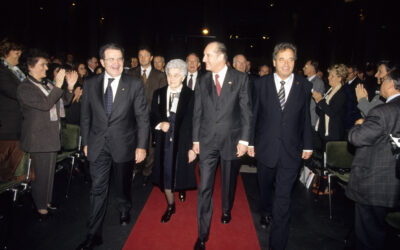 To bring back to one’s own Diocese and one’s own Church the riches of the experience made together: this was the intention of the 33 Bishops – Orthodox, belonging to the Ancient Oriental Churches, Anglicans, Methodists, Lutherans and Catholics of the different Rites – at the end of the 32° Ecumenical Convention organized by the Focolare Movement which was held in Jerusalem from November 18 to 22. They contributed to the theme of the Convention which was “The reciprocity of love among the disciples of Christ, not only through the deepening of theological and spiritual topics but also through a fraternal and sincere exchange of experiences among the Bishops.
To bring back to one’s own Diocese and one’s own Church the riches of the experience made together: this was the intention of the 33 Bishops – Orthodox, belonging to the Ancient Oriental Churches, Anglicans, Methodists, Lutherans and Catholics of the different Rites – at the end of the 32° Ecumenical Convention organized by the Focolare Movement which was held in Jerusalem from November 18 to 22. They contributed to the theme of the Convention which was “The reciprocity of love among the disciples of Christ, not only through the deepening of theological and spiritual topics but also through a fraternal and sincere exchange of experiences among the Bishops.
The central point of the meeting: a strong pact among them to constantly and always live their relationships with the imprint of the New Commandment: “As I have loved you, so too must you love one another”, because “By this they will know that you are my disciples: if you love one another’” (Jn. 13,31-35). The place that was chosen for this moment was very meaningful: the little “church” named “In Gallicantu” that lies along the pathway leading to the Cenacle at the Cedron stream, which according to tradition was the path that Jesus took after the Last Supper. Thus it is linked to his commandment of Love and to his prayer to the Father for the unity of those who followed him.
The Latin Patriarch S. B. Faoud Twal, greeted a group of Bishops during the preparation of the Convention. The meeting with the Greek-Orthodox Patriarch of Jerusalem,Theophilos III, was also significant. He considered the coming of the Bishops to Jerusalem as a blessing. “For the Christians of the Holy Land – he underlined – it is an encouragement to meet Bishops who are united, even if they belong to different Churches. It is also a strong support for us, because it is a clear sign that we have not been forgotten. You don’t only talk about dialogue but you are a living dialogue”.
They studied in detail two recent documents launched within the ecumenical field: “The Church: Towards a Common Vision” by the Faith and Order Commission of the World Council of Churches, and the document of the Lutheran-Roman Catholic Commission on Unity: “From Conflict to Communion” looking at the commemoration in 2017 of 500 years since the Reformation.
The Bishops were also informed about the experience of communion and collaboration within the network of Together for Europe that, respecting the specific character of each one, gathers together around 300 Movements and communities of various Christian Chruches for activities in common. Together for Europe is seen as a source of real hope by specialists, because it is an expression of what is often called the Ecumenism of life, considered by Vatican II to be the basis for all types of Ecumenism.
On November 2, the Bishops shared their ten-year experience of communion with about 120 people, among whom were notable people from the religious field and representatives of Movements and communities from different Churches present in the Holy Land. For their part, the Bishops also heard about constructive initiatives, often initiated by lay people, to improve relations among the Churches and the non-Christian communities of their country.
The visit every day to various holy sites made the life of Jesus feel even more present. This was especially true in Bethlehem, where the local community of the Focolare Movement gathered for a small event which, in the words of Helmut Sievers, “allowed everyone to experience the luminous presence of the Saviour in today’s world.”
Watch video (Franciscan Media Centre) “Love one another as I have loved you”—the 32nd Bishops’ Ecumenical Conference




0 Comments